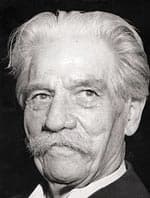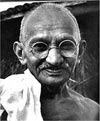
“Christianity has had to give up one piece after another of what it still imagined it possessed in the way of explanations of the universe. In this development it grows more and more into an expression of what constitutes its real nature.”
He received the 1952 Nobel Peace Prize in 1953 for his philosophy of “Reverence for Life”,
“Ethics is nothing other than Reverence for Life.
Reverence for Life affords me my fundamental principle of morality, namely, that good consists in maintaining, assisting and enhancing life, and to destroy, to harm or to hinder life is evil.”
– Albert Schweitzer
His philosophy was expressed in many ways, but most famously in founding and sustaining the Albert Schweitzer Hospital in Lambaréné, now in Gabon, west central Africa (then French Equatorial Africa). As a music scholar and organist, he studied the music of German composer Johann Sebastian Bach and influenced the Organ reform movement (Orgelbewegung).
“Any religion or philosophy which is not based on a respect for life is not a true religion or philosophy. “
– Albert Schweitzer
Related pages

